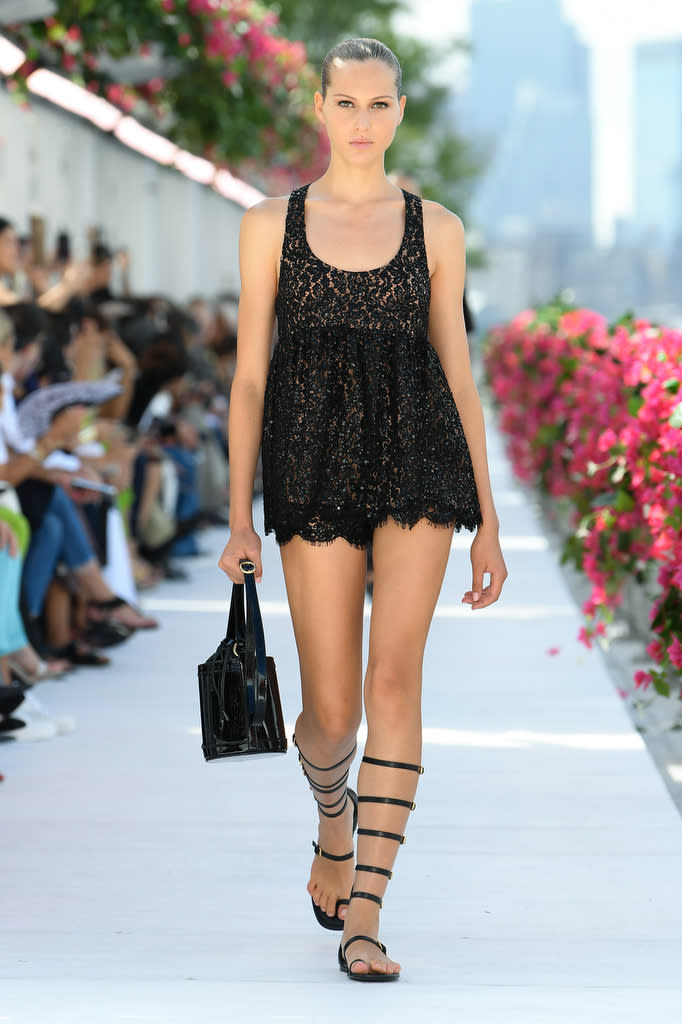Tapestry Gains Momentum as Capri Stumbles

Updated Feb. 8 at 4:37 p.m.
Wall Street is back in Tapestry Inc.’s corner.
More from WWD
Ralph Lauren CEO Patrice Louvet on Winning with Preppy Agility
How the 'Swans' of New York and More Made Their Way Into the Fall 2024 Collections
Wall Street Watches as Tapestry's Buyout of Capri Draws Nearer
Shares of the Coach, Kate Spade and Stuart Weitzman parent increased 6.5 percent to $42.99 on Thursday — for the first time putting stock above where it was trading in August, when it cut a deal to buy out rival Capri Holdings.
While investors were heartened by a strong quarter and an improved earnings outlook from Tapestry, performance at Capri Holdings is very much figuring into the companies’ future too.
And the trend isn’t good — at least for now.
After the market closed, Capri reported that net profits for its fiscal third quarter fell by 53 percent to $105 million from $225 million a year earlier. Adjusted earnings per share tallied $1.20 — a full 53 cents below the $1.73 analysts projected, according to FactSet.
Revenues for the quarter ended Dec. 30 fell 5.6 percent year-over-year to $1.4 billion from $1.5 billion.
John Idol, Capri’s chairman and chief executive officer, said: “Overall, our performance in the third quarter continued to be impacted by softening demand for fashion luxury goods. However, sales trends improved sequentially in the third quarter, driven by better results in our own retail channel while sales in our wholesale channel remained challenged. Additionally, we were pleased to have resolved the Michael Kors Americas Ecommerce implementation issues discussed last quarter and our platform is now running smoothly.”
Expectations for Capri weren’t high.
In an interview before the Capri results were released, Scott Roe, chief financial officer and chief operating officer of Tapestry, said the company had a good handle on what it was getting into when it signed the deal.
“Despite what may have been in their guidance and some of the expectations, we’ve been more clear-eyed on this business,” Roe said of Capri. “We used the word ‘prudent’ in our expectations. So we did not expect everything to go well.
“We saw there were issues in the current condition, but on the same token, we saw that the brand strength, equity and health of the brands and the affinity with the consumers remained strong,” he said.
The company is on track to close its buyout of Capri — parent to Michael Kors, Versace and Jimmy Choo — this calendar year. The deal would create a $12 billion fashion giant, although many are watching to see if Tapestry turns around and sells off Versace and Jimmy Choo to help pay for the transaction.

Tapestry took on $6.1 billion in debt in November to fuel the deal, but remains committed to getting its gross leverage ratio below 2.5x debt/adjusted earnings before interest, taxes, depreciation and amortization within two years of the transaction’s closing.
The plan is for Tapestry to use the playbook it has developed — from its data and operations savvy to its brand-building approach — and apply it to Capri.
“We just had a great quarter up and down the P&L, strong gross margins, strong operating margin, EPS, record quarter,” said Roe, adding that the company is producing cash and reinvesting it back in the business.
Tapestry sales grew 3 percent year-over-year to $2.1 billion for the quarter ended Dec. 30. Coach remains the company’s powerhouse, with sales that grew 6 percent in the quarter to $1.5 billion. Kate Spade’s sales fell 6 percent to $460.4 million, while Stuart Weitzman was off 4 percent to $82.2 million.
Tapestry’s net income for its fiscal second quarter slipped to $322 million from $330 million a year ago, but the bottom line looked much better when special items were factored out.
Neil Saunders, managing director of GlobalData, pointed out that the bottom line was weighed down by a $41.3 million increase in interest payments to manage debt.
“This underlines the risk associated with the deal: Tapestry will weaken its financials to acquire a company that has a lot of deep-seated problems,” Saunders said. “Our view remains that Tapestry is overpaying for Capri. When interest payments are removed, Tapestry increased net income by a very respectable 10 percent.”
Tapestry said its adjusted net income, which factors out much of that interest expenses, increased 14.2 percent to $377 million, with earnings per share of $1.63. That put EPS 17 cents ahead of the $1.46 analyst had penciled in.
Tapestry nudged up its outlook for the fiscal year and is now projecting EPS of $4.20 to $4.25, up from the $4.10 to $4.15 seen in November. Revenues are slated to rise 1 percent to about $6.7 billion.
Todd Kahn, chief executive officer and brand president of Coach, said the brand is on its way to more than $5 billion in sales this year — a key milestone.
“I feel like it is breaking the sound barrier,” Kahn said. “Coach got there 10 years ago, but then had it basically shrink to grow. The way we’re getting there today is, healthier margins, more brand heat and really bringing in new consumers. So I think when we break this sound barrier of $5 billion, we’re going to see even less friction for the next billion ahead.”
A lot of the impulse driving Capri is the belief that Tapestry’s experience with Coach will help it juice up Michael Kors.
“Not everything’s going to be transferable,” Kahn said. “Each brand has to stand on its own and go after its own customer in an authentic voice. But what Tapestry offers is that critical data analytics, that scale that we can bring to the table — whether that’s the [$200 million in cost] synergies or not — but ultimately bringing these six brands together, I truly believe will make each brand better.
“We’re seeing at Coach the discipline that we have on the accessible luxury positioning that we created, which … created the opportunity to be singularly focused on who the customer is going after,” he said. “And that becomes the touchstone for everything we do from our marketing message to our product creation. And we use the benefits of Tapestry and their data analytics and that rigor.”
Best of WWD


